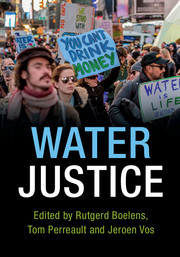Book contents
- Water Justice
- Reviews
- Water Justice
- Copyright page
- Contents
- Contributors
- 1 Introduction: The Multiple Challenges and Layers of Water Justice Struggles
- Part I Re-Politicizing Water Allocation
- Part II Hydrosocial De-Patterning and Re-Composition
- Part III Exclusion and Struggles for Co-Decision
- Part IV Governmentality, Discourses and Struggles over Imaginaries and Water Knowledge
- Introduction: Governmentality, Discourses and Struggles over Imaginaries and Water Knowledge
- 15 Neoliberal Water Governmentalities, Virtual Water Trade, and Contestations
- 16 Critical Ecosystem Infrastructure?
- 17 The Meaning of Mining, the Memory of Water
- 18 New Spaces for Water Justice?
- 19 Conclusions: Struggles for Justice in a Changing Water World
- Index
- References
19 - Conclusions: Struggles for Justice in a Changing Water World
from Part IV - Governmentality, Discourses and Struggles over Imaginaries and Water Knowledge
Published online by Cambridge University Press: 26 February 2018
- Water Justice
- Reviews
- Water Justice
- Copyright page
- Contents
- Contributors
- 1 Introduction: The Multiple Challenges and Layers of Water Justice Struggles
- Part I Re-Politicizing Water Allocation
- Part II Hydrosocial De-Patterning and Re-Composition
- Part III Exclusion and Struggles for Co-Decision
- Part IV Governmentality, Discourses and Struggles over Imaginaries and Water Knowledge
- Introduction: Governmentality, Discourses and Struggles over Imaginaries and Water Knowledge
- 15 Neoliberal Water Governmentalities, Virtual Water Trade, and Contestations
- 16 Critical Ecosystem Infrastructure?
- 17 The Meaning of Mining, the Memory of Water
- 18 New Spaces for Water Justice?
- 19 Conclusions: Struggles for Justice in a Changing Water World
- Index
- References
Summary
- Type
- Chapter
- Information
- Water Justice , pp. 346 - 360Publisher: Cambridge University PressPrint publication year: 2018
References
- 2
- Cited by



